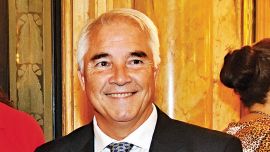We are at the dawn of a new and completely unexplored era in modern Argentina as ultra-libertarian leader Javier Milei takes over from President Alberto Fernández.
Not only is the eccentric economist an absolute outsider who only two years ago was no more than a talking head on nighttime TV shows, society has evolved to a place where distrust for institutions, even democracy, have reached levels believed to be impossible a few years back. In this context, Milei and his La Libertad Avanza coalition have won a popular mandate to revolutionise the state in order to curb excess, inefficiency and corruption. What, exactly, La Libertad Avanza is and who forms its ranks is something that is still difficult grasp in a context in which the president, along with sister and star adviser Karina ‘El Jefe’ Milei, have made it a habit of chopping off the heads of their collaborators once they have become obsolete (just ask Ramiro Marra, Carolina Píparo and even incoming vice-president Victoria Villaruel, or go back to 2021 when in the aftermath of earning a national deputy seat, Milei shook off the Libertarian Party) – our domestic version of Robespierre. Not only will Argentina’s president be the first “anarcho-capitalist” to govern a nation in history, as he likes to say, their capacity to run such a complex organisation with such a shallow team and unorthodox methodology puts the question of governability front and centre.
At the heart of Milei’s mandate is the need to finally end years of economic decadence in a country that perceives itself as rich in most senses of the word but mainly economically in terms of natural resources and culturally in terms of human capital. The economist has promised to return Argentina to its former status of “potencia,” which we could translate to ‘a globally relevant nation that is prosperous and successful,’ noting the country’s record as one of the richest in the world in per capita terms at the turn of the 20th century. Indeed, one of the main reasons people voted for Milei was his background as an economist, together with the perception that he has the skills and leadership to lead the country out of this mess, with runaway inflation deep in the triple digits and a perpetually depreciating currency. His solution, and his campaign promises, came straight out of a libertarian’s wet dream: torch the Central Bank, eliminate the currency, and take a chainsaw to the government to slash the state to its minimum expression.
With the responsibility to make his plan into reality now upon him, Milei has gone from fundamentalist to pragmatist, putting together an unexpected cabinet that barely counts any original cast members from La Libertad Avanza, and looks a lot like Mauricio Macri’s — the former president is said to have been duped by the libertarian who cut deals with former opponent Patricia Bullrich directly for the Security and Defence Ministries, and apparently with Luis ‘Toto’ Caputo for the Economy Ministry and Central Bank, leaving Macri partially out of the loop and the “circle of trust.” Milei has made it clear that his first priority will be to tackle the “snowball of Leliqs,” short-term papers held by financial institutions as a counterpart to people’s deposits, which need to be dismantled in order to lift currency controls (“cepo”).
Caputo’s presence suggests the plan is to raise fresh debt in order to buy out the stock of Leliqs, swapping them for some sort of dollar-denominated bonds. According to a report by Marra’s Bull Market Advisers (which Marra claims had no insider information nor was it previously revised by him), Caputo and his Central Bank governor, historical partner Santiago Bausili, will raise the official peso-dollar exchange rate to around 650 pesos per greenback, keeping currency controls in place until around February while looking for fresh financing. The financier and trader is looking to raise some US$12 billion to US$15 billion from sovereign wealth funds including Saudi Arabia and Qatar, get US$3 billion from the International Monetary Fund through fresh funds and refinancing, and another US$5 billion from the agro-exporting sector. Those US$23 billion would be enough to “rescue” the Leliqs and Central Bank debts allowing dollarisation or what they are calling “neo-convertibility” to happen at an implicit exchange rate of around 1,000 pesos per US dollar. This would require some sort of legislative package to be sent around early March, when Congress officially opens up shop, and the presumed exit of Caputo from the Economy Ministry, in order to make way for a more traditional economist like Federico Sturzenegger.
The counterpart of that plan is the “chainsaw” deficit reduction needed to achieve a budget surplus in his first year in office. Economist Diego Giacomini authored the original “chainsaw” along with Milei in their 2019 book Libertad, Libertad, Libertad – he’s also the person who introduced the president elect to libertarianism and was his only friend until they had a falling apart when Milei went into politics. In a recent piece in Perfil and in a conversation with digital subscribers this week, Giacomini explained that reducing the deficit by 15 percentage points of GDP is impossible in the near term and at the same time a precondition to make Argentina economically sustainable. Milei would have to slash spending between eight and ten percent in a year to make true on his promise, but he wouldn’t be able to get further than four percent according to Giacomini, being forced to finance the remaining deficit with money-printing, higher taxes, or more debt, all of which would reduce credibility given that they negate Milei’s campaign promises. Private investment and income from privatisations wouldn’t occur fast enough in Giacomini’s analysis, meaning that the only way to make the diluted “chainsaw” avoid being extremely recessionary and therefore socially and politically impossible to digest would be a whitewash tax moratorium on undeclared funds together with a substantial tax credit to incentivise adoption. According to his figures, year-over-year inflation will top 400 percent in the first quarter and could potentially slide to 290 percent by the end of 2024 if everything goes according to plan, finally dropping below the 70 to 100 percent range left by Martín Guzmán toward the end of 2025.
Which leads us back to the beginning: is this ambitious reform package possible in today’s Argentina? Not only does Milei’s La Libertad Avanza coalition lack congressional muscle, but both of its negotiating partners (Unión por la Patria and Juntos por el Cambio) are deeply fragmented, muddying the legislative front. At the same time, the Judiciary is expected to become another contested front where most of the incoming administration’s policies will be first disputed in the Contentious Administrative Federal Court, and later brought to the Supreme Court, which has already indicated it could question certain policies including dollarisation, as Ariel Stepmhelet and Giselle Leclercq explained in Perfil. Finally, does Milei have the temper, the political expertise in his cabinet, the negotiating capacity in Congress, the popular support in the streets, and the will to push through? And if he does, will luck be on his side?






















Comments